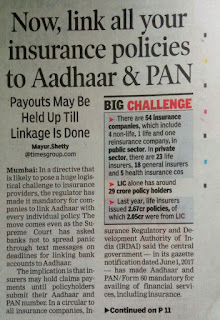An small
investor (and tax payer) is one who manages his finances in such a way that the
TDS is just equal to the tax he is supposed to pay for a particular year. You
need to balance your needs based on need for liquidity in hand, investment
returns and tax savings.
Every
individual get more tensed in the month of February /March every year as in this
month when they feels like they are being subject to extortion in form of Tax Deduction
at Source or Advance Tax. And advised if not want to pay tax then go to invest
in tax saving investments.
There
could be moments when you feel that you have paid too much of taxes or too much
of tax has been deducted from your salary. So to avoid such situation
one should start planning their taxes from the beginning of the year itself so
that you don’t end your year by paying more taxes.
When
the employer deducts tax at source, more particularly, during last two months,
as he would like to avoid defaults on his part, to save on interest and
penalties, he shall consider all your investments which give you tax deductions
or savings. While deducting tax at source, he shall consider investments such
as in
Insurance
premium,
Provident
fund contributions,
National
saving certificates,
Investment
in pension plans,
ULIPs,
Mediclaim etc.
Not
only this, he shall also consider certain amounts spent by you on specified
items and on your health such as
Tuition
fee of children (80C),
Repayment
of principal amount of home loan (80C),
Medical
expenses (80D, 80DD),
Expenses
on specified illnesses (80DDB) (upto Rs. 40,000 and Rs. 60,000 for senior citizens (Rs
1,00,000 wef A.y 2019-20) and for super senior citizen Rs 80,000 from A.y
2016-17 to 2018-19 ( Rs 1,00,000 from A.y 2019-20)
Any
amount of interest paid on educational loan (80E) etc.
Donations
made to specified eligible funds etc are also eligible for allowance (100% or
50% depending upon type of donation.
Employer
is also supposed to consider your house rent receipts but may ask
for landlord’s PAN number also.
You
can plan you taxes including TDS by integrating your tax planning and
investment planning. The investments you make should also have a tax saving
objective. If choosing between two options with similar returns and safety
features, tax saving would play an important role. In such situations,
investments like housing, provident funds, insurance, equity linked saving
options etc. can give you some relax feeling.
However, if
tax has been deducted in absence of investment or forget to inform the Deductor
in time (like bank etc), and your tax liability does not arise as per your
income details or tax deduction becomes more than actual tax liability, you should
not worry much as it is now mandatory for tax payers to quote then bank account
number and details in the return itself which makes refunds faster, safer and
hassle free.


















